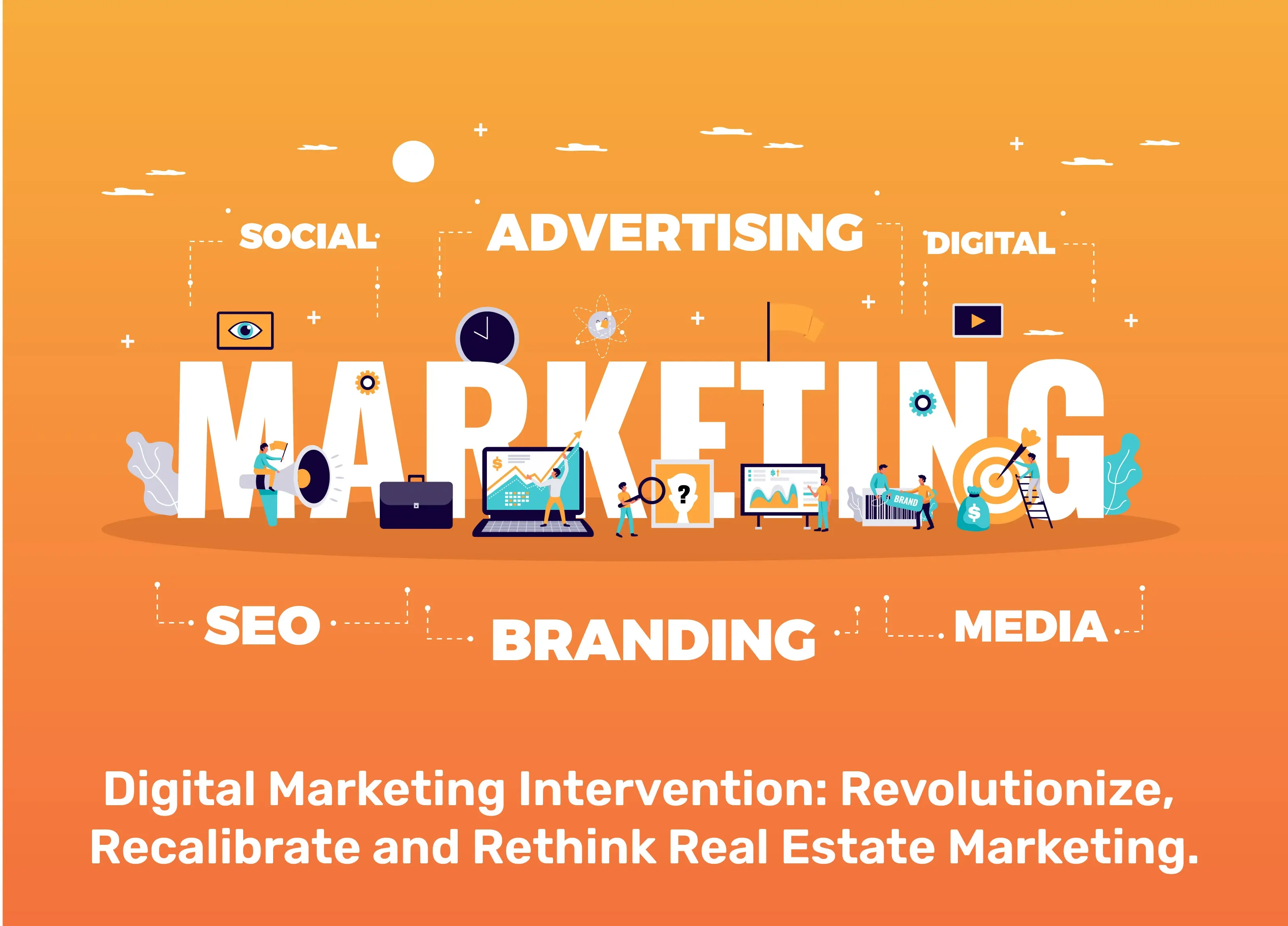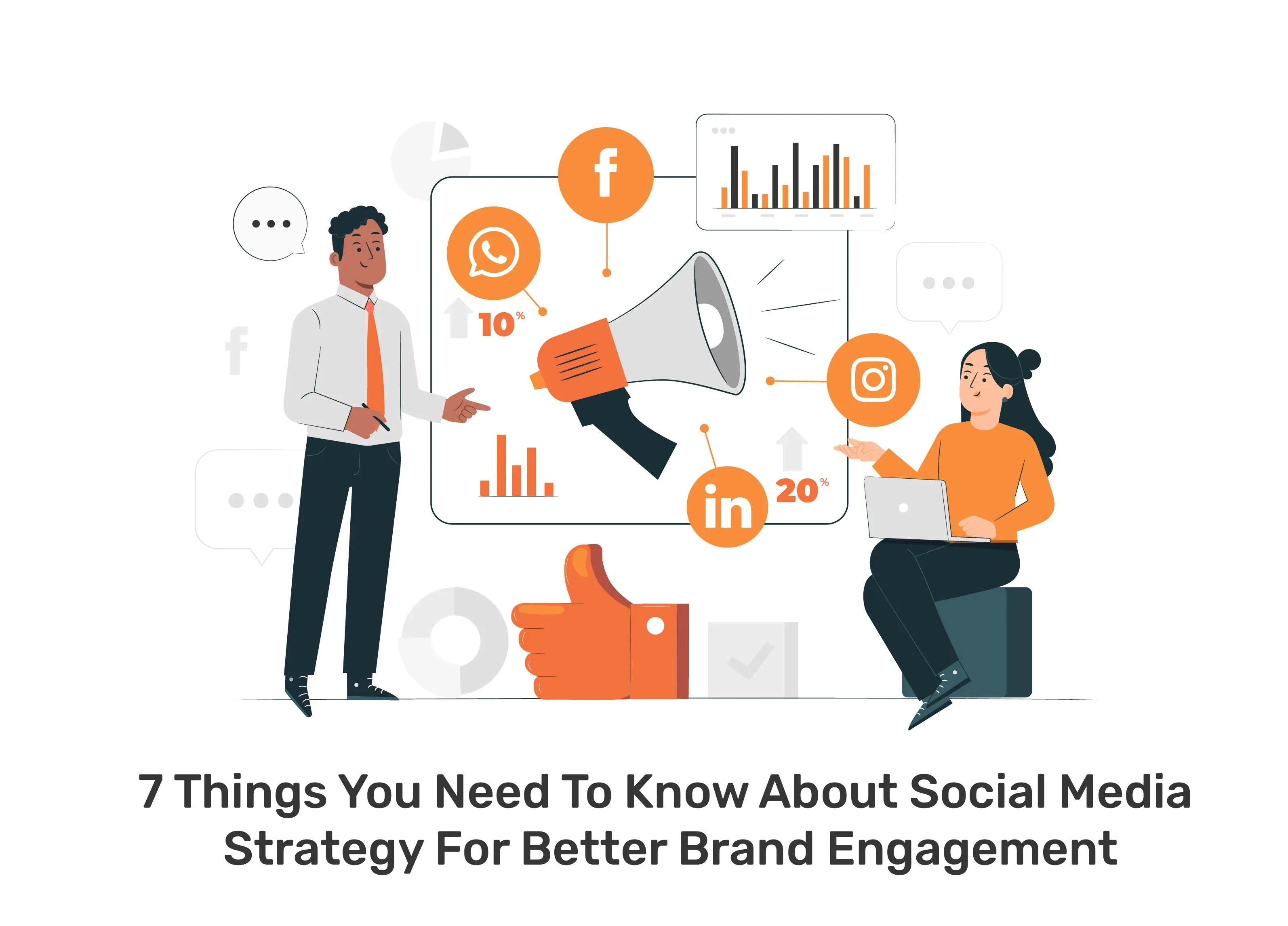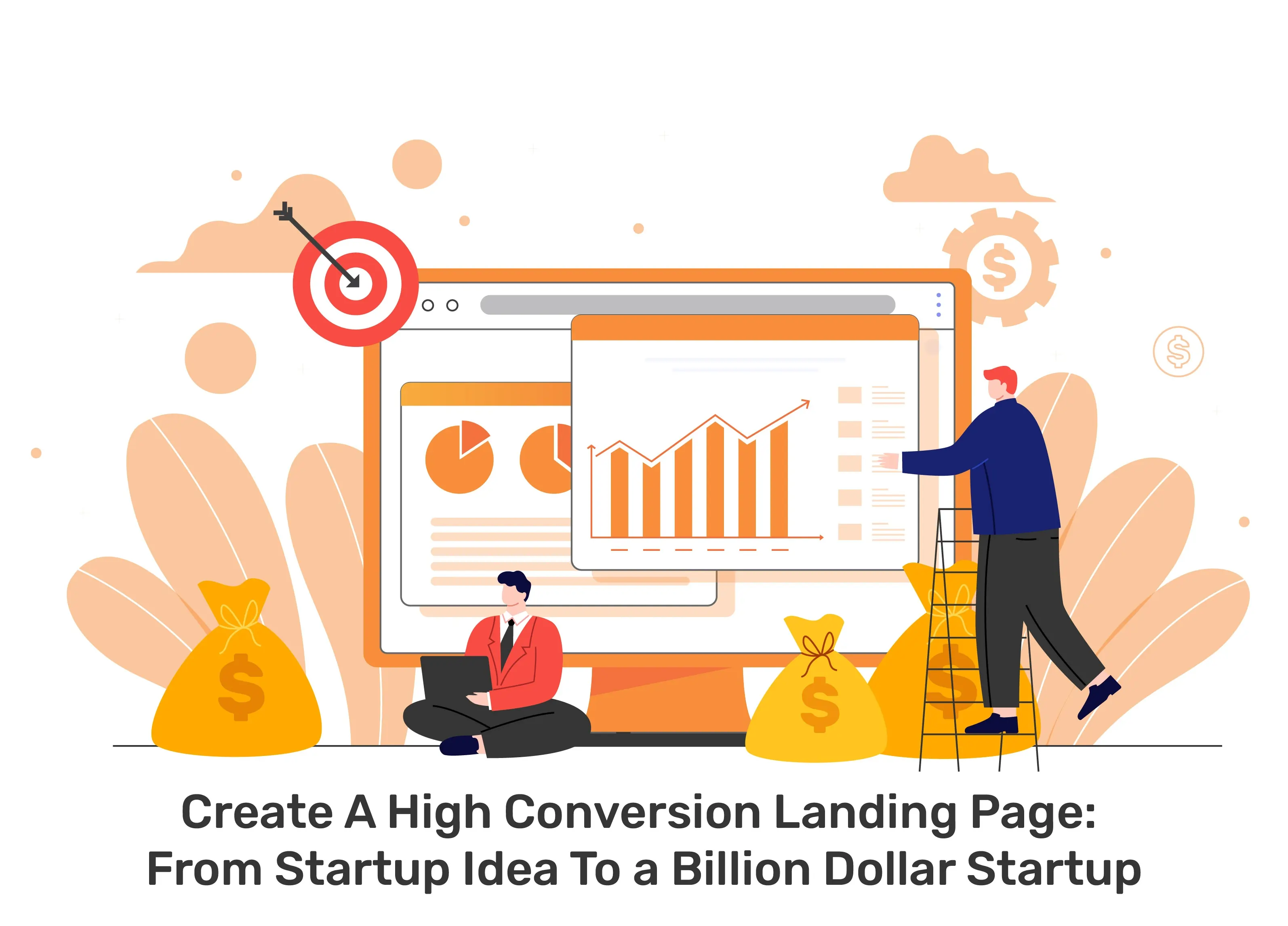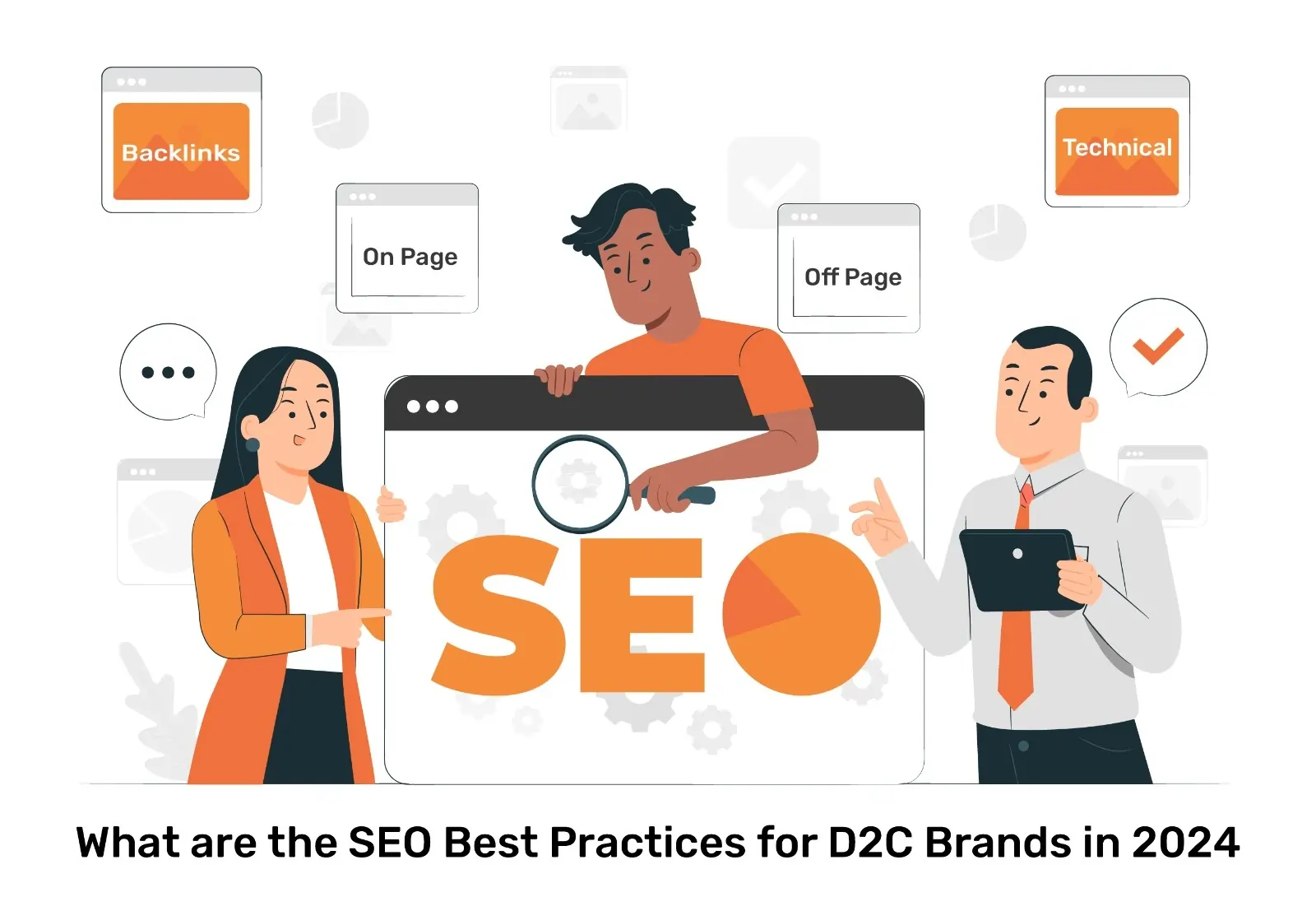Digital Marketing Intervention: Revolutionize, Recalibrate and Rethink Real Estate Marketing.

Introduction
The real estate industry has undergone a significant transformation in recent years, largely driven by the rapid advancements in digitization, increasing reliance on technology and the digital landscape becoming more pervasive. Real estate buyers are leveraging digital platforms to enhance their research before making a buy decision.
As per several research reports, many millennials and Gen Z have tremendous influence in the family’s decision-making process for home purchase.
· As per Digital Age research report by National Association of Realtors USA, 44% of buyers start their homy buying research and comparison online
· A whopping 90% of home buyers extensively hunt on digital platforms, and builder’s digital properties before home buying decisions
· Digital Natives search for relevant hashtags like #luxuryhomes, #amenities, #gatedcommunity #budgethomes, #1bhk etc. this has a big impact on the family’s home selection process
The global economy has experienced drastic pivot in business, delivery models, supply chain and pricing models in past two years, these dynamics have made the consumer smarter, rational and community driven.
Thus, the onus of engaging with potential buyers relies heavily on the marketing prowess of the builder.
What has happened in the past few years is that –
· Buyers’ behaviour has drastically changed due to ease of access to information across multiscreen devices
· There has been a massive surge in nuclear family structure in Tire 1 and Tire 2 cities
· Demand for budget and minimalistic homes have outpaced demand for large luxurious houses
· 40% to 50% of home buying research is done online before any kind of physical connect with brokers of builders
Given this, investing time, money and energy in digital is not an option but an inevitable integral strategy for real estate players.
We articulate next, the critical digital building blocks and imperatives that have become imperative for builders to succeed in this digital era.
As per several research reports, many millennials and Gen Z have tremendous influence in the family’s decision-making process for home purchase.
· As per Digital Age research report by National Association of Realtors USA, 44% of buyers start their homy buying research and comparison online
· A whopping 90% of home buyers extensively hunt on digital platforms, and builder’s digital properties before home buying decisions
· Digital Natives search for relevant hashtags like #luxuryhomes, #amenities, #gatedcommunity #budgethomes, #1bhk etc. this has a big impact on the family’s home selection process
The global economy has experienced drastic pivot in business, delivery models, supply chain and pricing models in past two years, these dynamics have made the consumer smarter, rational and community driven.
Thus, the onus of engaging with potential buyers relies heavily on the marketing prowess of the builder.
What has happened in the past few years is that –
· Buyers’ behaviour has drastically changed due to ease of access to information across multiscreen devices
· There has been a massive surge in nuclear family structure in Tire 1 and Tire 2 cities
· Demand for budget and minimalistic homes have outpaced demand for large luxurious houses
· 40% to 50% of home buying research is done online before any kind of physical connect with brokers of builders
Given this, investing time, money and energy in digital is not an option but an inevitable integral strategy for real estate players.
We articulate next, the critical digital building blocks and imperatives that have become imperative for builders to succeed in this digital era.
1. Omnichannel and Phygital Marketing Tactics prevails.
Omnichannel and phygital marketing tactics are becoming increasingly prevalent in the real estate industry. These approaches combine both physical and digital marketing strategies to create a seamless and integrated experience for potential home buyers.
Omnichannel marketing involves providing a consistent and cohesive experience across multiple channels, such as websites, social media platforms, email marketing, mobile apps, and physical locations.
Phygital marketing, on the other hand, refers to the integration of physical and digital elements in the overarching marketing strategy. Simply put, a home buyer can research and review the property online and subsequently visit the property location for furthering the sales process towards a closure, and the entire digital to physical transition delivers seamless and uniform experience, this is phygital marketing in real estate. While digital channels are essential, the physical world still holds significant value, especially in real estate.
The goal is to create a seamless and consistent experience across all channels, enhancing customer engagement, and ultimately driving conversions.
By adopting omnichannel and phygital marketing strategies, real estate brands can reach a broader audience, showcase detailed information, and offer interactive experiences that help potential buyers to make informed decisions.
Most importantly, it also helps real estate companies to collect data and insights on customer preferences and behaviors, allowing for more personalized and targeted outreach.
“A phygital strategy also increases client retention. According to research, companies with a phygital strategy have 91 percent greater year-on-year (YoY) customer retention than brands without a phygital plan.”
Omnichannel marketing involves providing a consistent and cohesive experience across multiple channels, such as websites, social media platforms, email marketing, mobile apps, and physical locations.
Phygital marketing, on the other hand, refers to the integration of physical and digital elements in the overarching marketing strategy. Simply put, a home buyer can research and review the property online and subsequently visit the property location for furthering the sales process towards a closure, and the entire digital to physical transition delivers seamless and uniform experience, this is phygital marketing in real estate. While digital channels are essential, the physical world still holds significant value, especially in real estate.
The goal is to create a seamless and consistent experience across all channels, enhancing customer engagement, and ultimately driving conversions.
By adopting omnichannel and phygital marketing strategies, real estate brands can reach a broader audience, showcase detailed information, and offer interactive experiences that help potential buyers to make informed decisions.
Most importantly, it also helps real estate companies to collect data and insights on customer preferences and behaviors, allowing for more personalized and targeted outreach.
“A phygital strategy also increases client retention. According to research, companies with a phygital strategy have 91 percent greater year-on-year (YoY) customer retention than brands without a phygital plan.”
2. Adoption of new age digi-tech solutions like:
a. Virtual tour
b. Enhanced visualization
c. Leverage AI and VR technologies
d. Visualization of internal architecture options
Digital solutions have revolutionized the way real estate properties are showcased to potential buyers. With the advent of virtual property tours, prospective buyers can now experience immersive walkthroughs of homes and properties from the comfort of their own devices.
High-quality videos, 3D virtual tours, and interactive floor plans provide an engaging and realistic experience, allowing buyers to visualize themselves that may lead buyers in making a physical visit.
Digital tools like augmented reality (AR) and virtual reality (VR) technologies offer the potential for even more immersive and interactive property experiences, further enhancing the impact of digital marketing in real estate.
b. Enhanced visualization
c. Leverage AI and VR technologies
d. Visualization of internal architecture options
Digital solutions have revolutionized the way real estate properties are showcased to potential buyers. With the advent of virtual property tours, prospective buyers can now experience immersive walkthroughs of homes and properties from the comfort of their own devices.
High-quality videos, 3D virtual tours, and interactive floor plans provide an engaging and realistic experience, allowing buyers to visualize themselves that may lead buyers in making a physical visit.
Digital tools like augmented reality (AR) and virtual reality (VR) technologies offer the potential for even more immersive and interactive property experiences, further enhancing the impact of digital marketing in real estate.
3. Targeted Advertising and Lead Generation:
One of the biggest challenges faced by brands today in digital promotion is loss of spends due to incorrect targeting of ads, i.e., displaying ads and targeting marketing communications to completely irrelevant audiences.
However, an efficient campaign strategy coupled with robust planning and execution negates this challenge. Brands in real estate should optimally deliver digital campaigns with specific targeting to the potential buyers and subsequently creating a database pool of prospective buyers.
Various digital channels, such as social media platforms, search engines, and email marketing, WhatsApp promotions to name a few, should be leveraged to precisely target their desired audience based on demographics, interests, and behaviors.
This allows them to showcase properties to potential buyers who are actively searching for relevant listings, significantly increasing the chances of conversion. Digital marketing tools like pay-per-click (PPC) advertising and search engine optimization (SEO) further optimize lead generation efforts, ensuring that interested prospects are directed to the right landing pages and websites.
However, an efficient campaign strategy coupled with robust planning and execution negates this challenge. Brands in real estate should optimally deliver digital campaigns with specific targeting to the potential buyers and subsequently creating a database pool of prospective buyers.
Various digital channels, such as social media platforms, search engines, and email marketing, WhatsApp promotions to name a few, should be leveraged to precisely target their desired audience based on demographics, interests, and behaviors.
This allows them to showcase properties to potential buyers who are actively searching for relevant listings, significantly increasing the chances of conversion. Digital marketing tools like pay-per-click (PPC) advertising and search engine optimization (SEO) further optimize lead generation efforts, ensuring that interested prospects are directed to the right landing pages and websites.
4. Building Trust and Credibility through Content Marketing:
Content strategy plays a crucial role in establishing trust and credibility in the real estate industry. By creating and sharing informative and valuable content depicting the features and services of the sellable properties, real estate players can position themselves as a unique and relevant player in the highly cluttered space.
Through digital marketing channels like websites, social media, and email newsletters, they can engage with their audience, address their queries, and provide information that will influence the buying decision.
Independent content awareness like educating buyers about the real estate market, investment opportunities, and trends creates a positive impact and perception in the minds of the general buyers. The Content team should consistently leverage digital and social media platforms extensively.
Through digital marketing channels like websites, social media, and email newsletters, they can engage with their audience, address their queries, and provide information that will influence the buying decision.
Independent content awareness like educating buyers about the real estate market, investment opportunities, and trends creates a positive impact and perception in the minds of the general buyers. The Content team should consistently leverage digital and social media platforms extensively.
5. Personalized Customer Engagement:
Personalized their customer engagement is kay for any B2C player. Strategies like below can be adopted in the overarching CRM approach by realtors:
Curated content tailored for specific TG
· Data-driven insights and analytics- like which region or age group is responsive and accordingly constantly fine tune the content accordingly.
· Evaluate the prospects’ preferences, interests, and behaviours.
· Data driven decision making enables to deliver personalized email campaigns, targeted advertisements, and customized recommendations.
Personalization not only enhances the customer experience but also improves the chances of conversion. By providing relevant and tailored information to potential buyers, real estate professionals can establish stronger connections, foster trust, and ultimately increase sales.
“As per a McKinsey report, personalization leads to revenue growth of up to 15% more and increases marketing-spend efficiency by 30%.”
Curated content tailored for specific TG
· Data-driven insights and analytics- like which region or age group is responsive and accordingly constantly fine tune the content accordingly.
· Evaluate the prospects’ preferences, interests, and behaviours.
· Data driven decision making enables to deliver personalized email campaigns, targeted advertisements, and customized recommendations.
Personalization not only enhances the customer experience but also improves the chances of conversion. By providing relevant and tailored information to potential buyers, real estate professionals can establish stronger connections, foster trust, and ultimately increase sales.
“As per a McKinsey report, personalization leads to revenue growth of up to 15% more and increases marketing-spend efficiency by 30%.”
Conclusion:
In conclusion, digital marketing interventions have transformed the real estate industry, empowering professionals to connect with potential buyers in a more targeted and engaging manner.
The ability to leverage digital channels for advertising, virtual property tours, content marketing, and personalized customer engagement has revolutionized traditional marketing approaches. By embracing these strategies, real estate companies can amplify their reach, increase lead generation, build trust and credibility, and ultimately drive sales.
As the digital landscape continues to evolve, staying abreast of the latest digital marketing trends and adopting innovative strategies will be crucial for real estate professionals to thrive in an increasingly competitive market. Embracing digital marketing interventions is not just an option; it has become a necessity for success in the modern real estate industry.
Written by Hitesh Mapara and Kamlesh Dixit — They are founders of the award-winning global integrated digital marketing agency DigiPaaji, www.digipaaji.com, is an integrated 360 digital performance marketing agency, headquartered in Mumbai & having physical offices in the USA, UK, Canada, and Dubai. They are serving global clients in different sectors in solving their digital marketing challenges.
In the real estate sector, www.digipaaji.com has helped clients in India in Mumbai, Pune, Bangalore, Ahmedabad, Indore, Gurgaon, and Middle East, and SE Asia in below areas by extensively leveraging digital platform solutions: Generating qualified leads; PPC campaigns; SEO; Indian diaspora targeting campaign; Creating pre-launch awareness; Immersive creative media; Project videos and explainer videos, and Online Reputation Management
The ability to leverage digital channels for advertising, virtual property tours, content marketing, and personalized customer engagement has revolutionized traditional marketing approaches. By embracing these strategies, real estate companies can amplify their reach, increase lead generation, build trust and credibility, and ultimately drive sales.
As the digital landscape continues to evolve, staying abreast of the latest digital marketing trends and adopting innovative strategies will be crucial for real estate professionals to thrive in an increasingly competitive market. Embracing digital marketing interventions is not just an option; it has become a necessity for success in the modern real estate industry.
Written by Hitesh Mapara and Kamlesh Dixit — They are founders of the award-winning global integrated digital marketing agency DigiPaaji, www.digipaaji.com, is an integrated 360 digital performance marketing agency, headquartered in Mumbai & having physical offices in the USA, UK, Canada, and Dubai. They are serving global clients in different sectors in solving their digital marketing challenges.
In the real estate sector, www.digipaaji.com has helped clients in India in Mumbai, Pune, Bangalore, Ahmedabad, Indore, Gurgaon, and Middle East, and SE Asia in below areas by extensively leveraging digital platform solutions: Generating qualified leads; PPC campaigns; SEO; Indian diaspora targeting campaign; Creating pre-launch awareness; Immersive creative media; Project videos and explainer videos, and Online Reputation Management








.png)